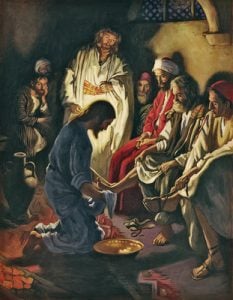Jesus in Jerusalem – Discussion Starters
1. The rejected one would become the chief cornerstone. Have you ever wondered how Jesus was able to tolerate the abuse and misunderstanding that marred His ministry on earth? Why did He allow Himself to be brought so low? Was He not fully qualified to be the ruler of the Jewish people? Was He not embued with wisdom far exceeding our paltry understanding?Couldn’t He have revealed His might and power on a day-to-day basis and let people find out on their own that he was King of Kings? Or did He do just that?
2. A prophesied coming. As splendid as King Solomon’s Temple was, God’s people desperately needed encouragement when the second temple was completed. Why? What did Zechariah contribute to an atmosphere of hope at that time? Wasn’t the animal Jesus rode in to Jerusalem a fulfillment of prophecy? What was the importance of this magnificent entrance? How did God’s people recognize Him as He rode into the city? What hope surpassed even the coming of Jesus in triumph? As they saw Jesus coming into Jerusalem, what did they imagine leaving? Aren’t you glad that you and I understand every detail of Jesus’ Second Coming so we won’t be confused? Or do we understand?
3. Jesus in the temple. Animal sacrifice was a dramatic means of presenting the gospel to the people through the centuries. How did that change during the time of Jesus’ ministry? The priests (ministers, pastors, evangelists) managed to destroy the significance of Jesus’ ministry. What about today? Do we let our pastors lead others astray by the way they present (or do not present) God’s word Sabbath after Sabbath? Is it hard for you to fully comprehend the importance of animal sacrifice in describing the gospel message? What does it mean to us today?
4. No fruit. Our lesson guide points out that the priests, or spiritual leaders, lost all their chances of blessing all people. Instead, they did without the fruit of the fig tree, and the benefit left them. But not everyone! What about the strong spiritual leaders who were “obedient to the faith”? Is it perplexing to you that the strong life-bearing presence of the Most High was both an all-powerful blessing to His people as well as a curse to those who rejected the power of God in their lives? Have you ever lived through a period of time in your life when you did not bear fruit? How can the emptiness of such an existence be overcome by the overwhelming ministry of Christ in us?
5. The stone. Imagine the sense of desperation when the “unusable” stone was brought to the temple site during construction. How was this carefully chiseled piece of rock unsuitable for the project? While working on other parts of the temple building project, what did the workers do with the stone that didn’t fit anywhere? We have a perfect picture of God among us, don’t we? Or do we? How much time went by while the rejected stone rested in the dust with no future that the workers could see? Until what? What circumstances led the workers to see the magnificent shape and structure of that stone? Do you and I still have work to do in understanding and receiving the ministry of the divine Cornerstone in our lives?
6. The cost of grace. Is there room in heaven for everyone? Has God provided for the salvation of each of us? Are you sure? Can we know without believing? Can we even begin to understand the price of our salvation? Can you and I ever repay God for the marvelous gift of eternal life and fellowship with Him and the family of God? Instead of “paying the price” for grace, what can we do with God’s gift to us? Is there more room in your church or Sabbath school for God’s presence in our lives and our witness?


Thank you for your questions, week to week!